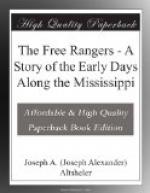The five were well prepared. They carried a large supply of ammunition, a blanket each, and jerked meat. If their food supplies gave out there was the forest swarming with game, and they knew that it swarmed in the same fashion all the way down to New Orleans. They would camp at sunset three or four miles from the Spaniards, keeping watch the night through, and in the morning it was easy enough to take up the trail of Alvarez and his men, which, to their experienced eyes, was like a high road leading through the forest.
One evening just as the sun was setting Henry parted some twining bushes and looked over a cliff. The others came to his side and they, too, looked as he was looking.
At their very feet lay the mighty Mississippi. They had seen it before, but it was never so impressive as now. Great at any time it was in spring flood, rolling a vast, yellow current down toward the Gulf. The waters overflowed on the low, eastern shore, and it was so far across that they could not see the further bank in the shadowed evening. The setting sun, nevertheless, lighted up the middle of the current with blood-red gleams, and the five gazed with a certain awe at the mighty stream, as it flowed ever onward. It was the highly imaginative Paul who was impressed the most.
“We know where it goes to,” he said, “but I wonder where it comes from.”
Henry waved his hand vaguely toward the North.
“Up there somewhere,” he said, “a thousand miles from here, or maybe two thousand. Nobody can tell.”
Paul did not say anything more, but continued to gaze at the vast, yellow current of the Mississippi, coming out of the unknown regions of the far north and flowing into lands of the far south, almost as mysterious and, vague, once belonging to France but now owning the lordship of Spain. It was the homely language of Shif’less Sol that recalled him from his dreams.
“It’s purty big out thar, an’ looks ez if you couldn’t tamper with it—this here river stands no foolin’—but do you know, Paul, water’s pow’ful friendly. It’s always travelin’ about, always on the move. Land stands still, it’s always thar, an’ never sees nothin’ new, but water jest keeps a’ movin’, seein’ new countries, here to-day, somewhar else to-morrow, lavin’ new banks, breathin’ new air, floatin’ peacefully on to new people, gatherin’ in their talk an’ ways.
“Jest think! This river comes out o’ we don’t know whar, sees all the wilderness, whispers to the bars and buffaloes an’ Injun tribes ez it goes by, takes a look at us standin’ here on the bank, an’, after wonderin’ what we’re about, slips on down hundreds o’ miles to Louisianny, gazin’ at the French thar on the bank at New Orleans, an’ then shoots out into the sea.”
“Thar to be lost,” said the unpoetical Long Jim.




